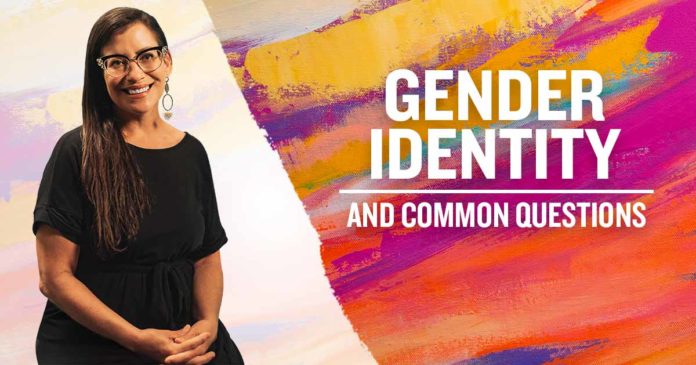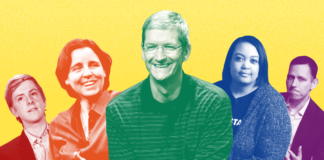
Cisgender, non-binary, gender-fluidity — it seems that every day, we’re hearing about more and more about aspects related to gender identity.
Gender identity as a concept was popularized by John Money in the 1960s. He founded the Gender Identity Clinic at Johns Hopkins University and formulated, defined, and coined the term “gender role” and later expanded it to gender-identity/role.
The dictionary’s inclusion of the singular “they” as a nonbinary pronoun in 2019 illustrated a shift in society’s evolution in acceptance of gender identity.
In the last installment UCF’s three-part video series in celebration of LGBT History Month, senior instructor Leandra Preston ’98 ’02MA ’15PhD guides us through gender, gender identity and gender expression.
Preston has served as an instructor for the women’s and gender studies program at UCF for nearly two decades. She earned her bachelor’s and master’s degrees in English and her doctorate in texts and technology. Her research encompasses various aspects of technology and bodies, including studying the use of beauty technologies, such as airbrushing in photo-editing programs or cosmetic procedures, to uphold or resist gender norms.
Terms
The Human Rights Campaign offers a thorough glossary of terms. Here are several of the more common terms they define that you recently might be hearing more about:
- Gender identity: One’s innermost concept of self as male, female, a blend of both or neither – how individuals perceive themselves and what they call themselves. One’s gender identity can be the same or different from their sex assigned at birth.
- Gender expression: External appearance of one’s gender identity, usually expressed through behavior, clothing, body characteristics or voice, and which may or may not conform to socially defined behaviors and characteristics typically associated with being either masculine or feminine.
- Gender-fluid: A person who does not identify with a single fixed gender or has a fluid or unfixed gender identity.
- Non-binary: An adjective describing a person who does not identify exclusively as a man or a woman. Non-binary people may identify as being both a man and a woman, somewhere in between, or as falling completely outside these categories. While many also identify as transgender, not all non-binary people do. Non-binary can also be used as an umbrella term encompassing identities such as agender, bigender, genderqueer or gender-fluid.
- Cisgender: A term used to describe a person whose gender identity aligns with those typically associated with the sex assigned to them at birth.
- Transgender: An umbrella term for people whose gender identity and/or expression is different from cultural expectations based on the sex they were assigned at birth. Being transgender does not imply any specific sexual orientation. Therefore, transgender people may identify as straight, gay, lesbian, bisexual, etc.
UCF Courses on Gender
ANT 3302 – Sex, Gender and Culture
The traditional and changing roles of women and men viewed in a cross-cultural perspective.
ANT 4171 – Anthropology: The Battle of the Sexes?: The Archaeology of Gender
Advances in archaeological research on gender, sexuality and social identity.
COM 4014 – Gender Issues in Communication
A study of how communication exchanges, both verbal and non-verbal, differ between men and women, and how these differences are manifested.
EUH 4426 – Sex and Gender in Antiquity
Examines the concepts of sex and gender in Greek and Roman societies and their impact on modern society.
HUM 3326 – Theories of Sex and Gender in Humanities
Historical and contemporary theories of sex and gender relevant in interdisciplinary humanities.
HUM 4823 – Queer Theory in the Humanities
Developments in queer theory. Challenge to research by scholars, activists, performers, and visual artists.
INR 4085 – Women, Gender, and Globalization
Feminist and gender perspectives in international relations, globalization, and international political economy.
PLA 4886 – Sexuality, Gender and the Law
Examine and analyze legal issues concerning gender and sexuality with emphasis on right to privacy, legal theories of sex and sexual orientation, and sexual discrimination.
WST 3603 – Introduction to Gender StudiesHistorical and cultural foundations of gender, sexuality, and intersectional theories with attention to fluidity of identities and diversity of experiences. WST 3610 – Gender and TechnologyExamines the role of gender, race, class, and sexuality in the development, employment, and dissemination of technology in its various forms, including technologies of/around gender, such as domestic, sexual and reproductive, beauty, body, and body technologies.WST 3621 – Theories of MasculinityMasculinity from feminist perspectives, examining issues of race, class, sexuality, and violence, as well as constructions of masculinity in sports, family, and other institutions.
Resources
Human Rights Campaign is one of the most effective mainstream advocacy organizations in the country whose goal is to ensure that all LGBTQ people — particularly those who are trans, people of color and HIV+ — are treated as full and equal citizens.
Equality Florida is the largest civil rights organization dedicated to securing full equality for Florida’s lesbian, gay, bisexual and transgender community.
–Central Florida Area
LGBTQ History Museum of Central Florida is an organization that digitally collects, preservers and exhibits history of the gay, lesbian, bisexual and transgender community in the region.
OneOrlando Alliance, which formed as a result of the Pulse nightclub tragedy in 2016, is now a coalition of over 40 service based organizations that provide LGBTQ+ specific programs to the Orlando community.
The Center promotes and empowers the LGBT community and its allies through information, education, advocacy and support.Zebra Coalition is a network of organizations which provide services to lesbian, gay, bisexual, transgender and all youth (LGBTQ+) ages 13 – 24.
–At UCF
Career Services counselors have gone through training and programs to best work with and address the concerns LGBTQ+ students have related to future employment. Read more about their tips for LGBTQ internship and job seekers.
Counseling and Psychological Services (CAPS) offers free mental health counseling to all students and is available for consultation to the university community. CAPS is dedicated to providing these services in an atmosphere that is welcoming and comfortable for all, regardless of race, gender, ethnic background, age, sexual orientation, citizenship or physical ability.
Delta Lambda Phi Fraternity provides brotherhood and growth opportunities for gay, bisexual, transgender, and progressive men.
Green Dot is a bystander intervention training program that aims to reduce power based personal violence on campus by training students, faculty, and staff how to become active bystanders.
LGBTQ+ Services connects our diverse student population to opportunities, resources, and each other to achieve the vision of a stronger, healthier, and more equitable world for LGBTQ+ people and its allies.
Office of Diversity and Inclusion offers training for students, faculty and staff in a variety of topics, with workshops included Safe Zone LGBTQ+ 101, Gender Difference in Communication, and Inclusive Communication. All workshops are free unless otherwise noted.
Out in Science, Technology, Engineering, and Mathematics at the University of Central Florida (O-STEM at UCF)promotes professional development while uniting students of STEM majors and LGBTQ+ identities.
Pride Faculty and Staff Association provides quality programming, networking opportunities, and guidance to UCF’s LGBTQ+ students, faculty, and staff on all UCF campuses. Membership is open to all current and retired UCF faculty and staff regardless of age, race, gender, gender expression, creed, nationality, faith/non-faith system, or sexual orientation, who support the mission and goals of PFSA as outlined in the bylaws.
Social Justice and Advocacy supports efforts to increase equal access to campus resources and opportunities, while cultivating inclusiveness to the least advantaged members of the campus community.
Student Legal Services is available for consultation if you think you have been discriminated against due to being LGBTQ+.
Lavender Council is a student advisory board that serves as a liaison between students, faculty, and staff and LGBTQ+ Services that works to make UCF a more accepting, welcoming and equitable campus.
UCF Libraries Diversity and Education: LGBTQ Resources is a list of online books, encyclopedias, and handbooks.
UCF Libraries GLBTQ Resources is a collection of historical resources related to gay, lesbian, bisexual, transgender and queer history.
Victim Services can help you put the pieces back together if you, or someone you know, has been impacted by crime, violence or abuse.








